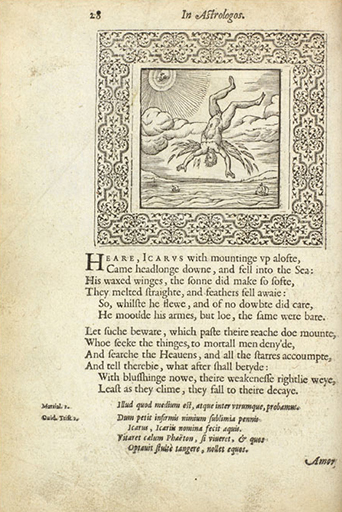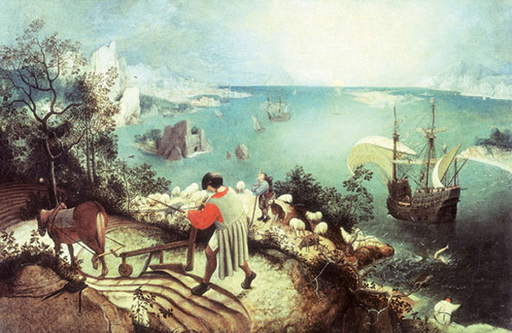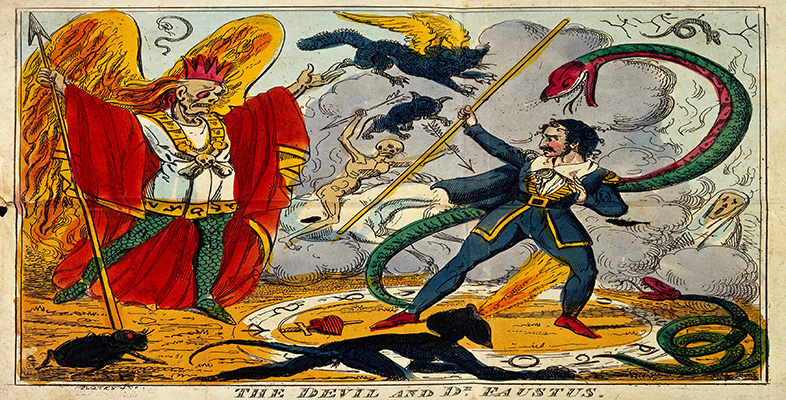2 Reading Doctor Faustus
2.1 Act 1, Scene 1: "Yet art thou still but Faustus, and a man"
2.1.1 The morality play
Before looking at the play's opening scene I should add a brief note on the medieval morality play, the type of drama on which Marlowe draws in adapting The Damnable Life for the stage. After the Prologue and Faustus's long opening speech, you may have been startled by the appearance of the Good and Evil Angels. Even if you had expected to find supernatural beings in a play about a man who sells his soul to the devil, the Good and Evil Angels may have struck you as strange, perhaps because they are not what we expect characters in literary texts to be like. Their names tell us pretty much everything we need to know about them for, rather than having individualised personalities, they represent abstract moral qualities – in this case, goodness and evil. At this point and throughout the play they are engaged in a struggle for the soul of Faustus, the Good Angel warning him of the danger of arousing ‘God's heavy wrath’ (Act 1, Scene 1, line 74 – displayed as 1.1.74) by practising black magic, the Evil Angel egging him on by reminding him of the power that necromancy will bring him.
This way of creating characters, or characterisation, is typical of morality plays, which are fundamentally religious dramas that enact the conflict between good and evil, each of which is embodied in supernatural figures (like Mephistopheles and Lucifer) or personified abstractions (like the Good and Evil Angels and the Seven Deadly Sins). They are shown fighting for the soul of a central human character who often represents humanity itself, hence the title of one of the best-known morality plays, Everyman. The aim of the morality play was primarily didactic; that is, it sought to teach its audience, and to offer moral and spiritual lessons about how to live a good Christian life. In Doctor Faustus, this didactic element can be seen most clearly in Marlowe's use of a Chorus to present a Prologue and Epilogue that, rather like the Choruses of ancient Greek tragedies, express traditional attitudes and guide the audience's response to the play. (In Greek tragedy the Chorus was a group of people, whereas in Doctor Faustus and Elizabethan drama generally, it is one person.) Yet morality plays also sought to entertain their audiences; they are full of clowning and knockabout comedy, just as in Doctor Faustus.
Morality plays were prevalent in England during the late Middle Ages, but were still popular when Marlowe was writing. The fact that he turned to the morality play when he came to dramatise The Damnable Life raises questions about the genre of Doctor Faustus: what kind of play is this? Is it essentially a late sixteenth-century morality play, warning its audience of the dire consequences of practising black magic? Or is its attitude to the story it tells more complicated than this? How does the play encourage us to respond to the central character who sells his soul to the devil?
Activity
We can begin to answer those questions by looking at the Prologue. Please reread the speech now, and then write a brief summary of it, no more than four or five sentences. What main points would you say the Chorus is making here?
Discussion
Here is what I've come up with:
The Chorus spends several lines telling the audience what the play is not about – war or love or martial heroism – before he tells us what it is about: ‘Faustus' fortunes, good or bad’ (l. 8).
Then he tells us about Faustus's childhood, specifically that although he was born to ‘parents base of stock’ (l. 12), he went on when he was older to study divinity at the University of Wittenberg, where his intellectual brilliance led swiftly to his being awarded a doctorate.
In line 20, the tone of the speech seems to change, as the Chorus speaks of Faustus's ‘cunning of a self-conceit’, which has been explained as ‘intellectual pride engendered by arrogance’.
The Chorus goes on to explain that his intellectual pride led Faustus to take up the study of magic, or ‘cursèd necromancy’, despite the fact that it jeopardises ‘his chiefest bliss’ (l. 27); that is, his chance of being granted eternal salvation when he dies.
The Chorus, then, is kicking things off by giving us a brief biography of the play's protagonist. I hope you agree that the picture of Faustus it offers us is a mixed one. The Chorus undoubtedly condemns Faustus's study of magic and encourages us to disapprove of it too. But the speech also registers the greatness of a man who, through his own merit, overcame the considerable disadvantage of lowly birth to rise to the pinnacle of his profession.
Let's look a little more closely now at the last eight lines of the Prologue. When the tone of the speech changes in line 20, the Chorus says not just that Faustus is full of intellectual pride and arrogance, but that he is ‘swollen’ with it. This is easy for us to understand, for we still use the expression ‘swollen head’ to describe someone who thinks too highly of himself. We also understand that the Chorus is not using the adjective ‘swoll'n’ literally; it is not that Faustus is actually swollen up, but that he has an inflated opinion of himself. In other words, ‘swoll'n’ is used in a figurative rather than a literal way. Figurative language describes one thing by comparing it with something else. The two most well-known types of figurative language are similes and metaphors. Similes make a direct comparison by using the word ‘like’ or ‘as’. If Marlowe had written ‘Till, swoll'n like a balloon with cunning of a self-conceit’, he would have made a direct comparison between Faustus's pride and an inflated balloon. But he chose to use not a simile but a metaphor, with the result that rather than being likened to a particular inflated object, pride is identified more broadly with the condition of being swollen.
This metaphor is followed by the lines: ‘His waxen wings did mount above his reach, / And melting heavens conspired his overthrow’ (ll. 21–2). This is an allusion to the ancient Greek myth of Icarus, who attempted to escape from Crete with a pair of waxen wings, but flew too near the sun and plunged to his death when the sun melted the wax (see Figures 2 and 3). He became the symbol of the ‘overreacher’, of the man who tries to exceed his own limitations and comes to grief as a result. Like Icarus, in the Chorus's view, Faustus tried to ‘mount above his reach’ and was punished for his presumption: ‘heavens conspired his overthrow’ (l. 22). This is an intriguing twist on the Icarus myth; for whereas Icarus's pride seems to be self-destructive, Faustus's sparks the intervention of a deity who ‘conspires’ to destroy him.


It is interesting to compare Brueghel's treatment of the myth with that of Marlowe's Chorus and Whitney's emblem. Icarus, just visible in the bottom right of the painting as he sinks to his death in the sea, is unnoticed as the rest of the world goes about its business. The American poet William Carlos Williams (1883–1963) wrote the following poem about Pieter Brueghel's Landscape with the Fall of Icarus, (1555):
Landscape with the Fall of Icarus
According to Brueghel
when Icarus fell
it was spring
a farmer was ploughing
his field
the whole pageantry
of the year was
awake tingling
near
the edge of the sea
concerned
with itself
sweating in the sun
that melted
the wings' wax
unsignificantly
off the coast
there was
a splash quite unnoticed
this was
Icarus drowning
What happens to the language when the Chorus starts to talk about Faustus's study of magic? In the two lines ‘And glutted more with learning's golden gifts, / He surfeits upon cursèd necromancy’ (ll. 24–5), ‘glutted’ means ‘overfull’, or ‘stuffed’, and ‘surfeits’ means ‘to eat too much’, ‘to gorge oneself’. Why is the Chorus referring to eating, specifically to eating too much? It seems that once again the language is not working literally; instead, it is drawing metaphorical links between Faustus's intellectual curiosity and a kind of greedy self-indulgence. He is portrayed as a glutton who, stuffed full of ‘learning's golden gifts’, turns to magic and gorges himself on that as well.
So, by looking closely at the language of the Prologue, we can see more clearly what the Chorus is saying about Faustus – that it associates his intellectual ambition with an immoderate appetite, with an inflated sense of his own value, and with a dangerous, Icarus-like overreaching that brings him into conflict with the Christian God. So even though the Prologue praises Faustus for his intellectual brilliance, it also insists that this brilliance is not an unqualified good; if it pushes past certain boundaries, it becomes sinful and provokes divine punishment. The Prologue tells us, in short, that the play's protagonist lives in a Christian universe that places limits on the pursuit of knowledge.
